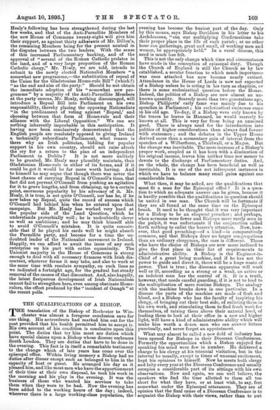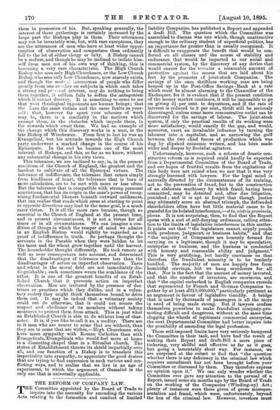THE QUALIFICATIONS OF A BISHOP. T HE translation of the Bishop
of Rochester to. Win- cheater was almost a foregone conclusion save for one thing. His antecedents had marked him out for the post provided that his health permitted him to accept it. His own account of his condition is conclusive upon this point. The duties that try him most are duties which have special claims upon a Bishop whose diocese embraces South London. They are duties that have to be done in the evening. This fact is in itself a, remarkable testimony to the change which of late years has come over the episcopal office. Within living memory a Bishop had no duties after dinner except such as belonged to him in the capacity of host or guest. He arranged his day as it pleased him, and like most men who have the apportionment of their time at their own disposal, he took his work in the morning and his play in the evening. It was the business of those who wanted his services to take them when they were to be had. Now the evening has been added to the working hours of the day ; indeed, wherever there is a large working-class population, the evening has become the busiest part of the day. Only by this means, says Bishop Davidson in his letter to his Archdeacons, "can our multiplying Confirmations take their proper place in the life of each parish ; at no other hour can gatherings, great and small, of working men and women, be appropriately held." In a rural diocese, this need is much less felt.
This is not the only change which time and circumstance have made in the conception of episcopal duty. Though the Church of England is still the Church as by law established, a secular function to which much importance was once attached has now become nearly extinct. Attendance in the House of Lords is now not expected of a Bishop unless he is acting in his turn as chaplain, or there is some ecclesiastical question before the House. Indeed, the politics of a Bishop are now almost an un- known quantity. Scarcely more than two generations ago, Bishop Phillpotts' early fame was mainly due to his speeches in Parliament ; his ecclesiastical eminence came in his old. age. To-day, if a Bishop were only known by the traces he leaves in Hansard, he would scarcely be known at all. This is very far from being an unmixed good. There is always need for the introduction into politics of higher considerations than always find favour with statesmen ; and the debates in the Upper House derived more than a momentary gain of interest from the speeches of a Wilberforce, a Thirlwall, or a Magee. But the change was inevitable. The mere increase of a Bishop's proper work, coupled as it has been with a diminution of his original income, leaves him neither time nor money to devote to the discharge of Parliamentary duties. And, on the whole, the change has been beneficial as well as inevitable. It is one of the not infrequent instances in which we have to balance many small gains against one considerable loss.
What then, it may be asked, are the qualifications that most fit a man for the Episcopal office ? It is a ques- tion to which no adequate answer can be given, because it is hardly possible that the qualifications in question should be united in one man. The Church will be fortunate if they are all found at the same time on the Episcopal bench. It used to be thought that it was very important for a Bishop to be an eloquent preacher ; and perhaps, when sermons were fewer and Bishops more rarely seen in the pulpit, it was unfortunate if the conjunction called forth nothing to enlist the bearer's attention. Now, how- ever, that good preaching—of a kind—is comparatively common, and that Bishops draw no larger congregations than an ordinary clergyman, the case is different. Those who have the choice of Bishops are now more inclined to give the first place in their list of requirements to administrative ability. A Bishop is the Engineer-in- Chief of a great living machine, and if he has not the power to guide and direct it, there will be a huge waste of power. That is true ; the diocesan apparatus will work well or ill, according as a strong or a weak, an active or an indolent man has the control of it. It is a truth, however, that needs careful guarding, if it is not to lead to the multiplication of mere routine Bishops. The analogy with the machine breaks down in one particular. In a diocese the parts of the machine are made of flesh and. blood, and a Bishop who has the faculty of inspiring his clergy, of bringing out their best side, of enlisting them in his own work, and stimulating them to find fresh work for themselves, of raising them above their natural level, of leading them to look at their office in a new and higher light, will have a kind of administrative ability which will make him worth a dozen men who can answer letters punctually, and never forget an appointment.
What may almost be called. a new field of industry has been opened for Bishops in their Diocesan Conferences. Formerly the opportunities which a Bishop enjoyed for speaking his mind were few in number. He delivered a charge to his clergy at his triennial visitation, but in the interval he usually, except in times of unusual excitement, kept his opinions to himself. Now he meets both clergy and laity every year at the Diocesan Conference and usually occupies a considerable part of its sittings with his own observations. Now and again, we can well believe, the speakers who find the time allotted to them all too short for what they have, or at least wish, to say, fret somewhat under the Episcopal utterances. They are of opinion that the final cause of a Diocesan Conference is to acquaint the Bishop with their views, rather than to put them in possession of his. But, speaking generally, the interest of these gatherings is certainly increased by the large part the Bishops play in them. Their utterances may not be invariably wise, but, with rare exceptions, they are the utterances of men who have at least wider oppor- tunities of observation and comparison than ordinarily fall to the lot of either clergy or laity. A Bishop cannot be a recluse, and though he may be inclined to isolate him- self from men not of his own way of thinking, this is becoming a very rare characteristic. The High Church Bishop who sees only High Churchmen, or the Low Church Bishop who sees only Low Churchmen, now scarcely exists, and though the mutr al intercourse of people who differ greatly from one ar:,ther on subjects in which each takes a strong and penal interest, may do nothing to bring them together, it seldom fails to soften the antagonism which it cannot destroy. It is something to come to see that your theological opponents are human beings ; that the have the same virtues and the same faults as your- self ; that, however far apart your schemes of work may be, there is a similarity in the motives which prompt them, in the obstacles which impede them, in the rewards which await them. We had an example of the change which this discovery works in a man, in the late Bishop of Winchester. From first to last he was an Evangelical, but his attitude towards the High Church party underwent a marked change in the course of his Episcopate. In the end he became one of the most tolerant of Bishops, and this, so far as we know, without any substantial change in his own views.
This tolerance, we are inclined to say, is, in the present condition of the Church of England, the greatest and the hardest to cultivate of all the Episcopal virtues. The tolerance of indifference, the tolerance that comes simply from kindliness of heart, the tolerance that is born of mere calculation, are to be met with more or less often. But the tolerance that is compatible with strong personal convictions, that has its origin in the man's power of recog- nising fundamental likeness beneath outward unlikeness, that can realise that roads which seem at starting to point in opposite directions may lead to the same goal, is a much rarer virtue. It is all the more rare because, though so essential in the Church of England at the present time, and. in present circumstances, it is not a virtue for all times or in all circumstances. We can imagine a con- dition of things in which the temper of mind we admire in an English Bishop would rightly be regarded as a proof of indifference to truth. So perhaps thought the servants in the Parable when they were bidden to let the tares and the wheat grow together until the harvest. The householder thought differently. He took remote as well as near consequences into account, and determined that the disadvantages of tolerance were less than the disadvantages of action on imperfect observation. Tares and wheat in the moral field are not immediately dis- tinguishable; each sometimes wears the semblance of the other. It is one of the greatest benefits of an Estab- lished Church that it prevents action on imperfect observation. Men are irritated by the presence of doc- trines or practices which they dislike, and in a volun- tary society they might think themselves bound to drive them out. It may be indeed that a voluntary society could not do otherwise, that it could not secure the respect and obedience of its members without taking measures to protect them from attack. This is just what an Established Church is able to do without loss of char- acter. It is, if you like to call it so, a medley. There are in it men who are nearer to some that are without, than they are to some that are within,—High Churchmen who have more sympathy with Roman Catholics than with Evangelicals, Evangelicals who would feel more at home in a dissenting chapel than in a Ritualist church. The status of Establishment throws its shield impartially over all, and one function of a Bishop is to translate this impartiality into sympathy, to appreciate the good desires that are trying to find expression in such various and con- flicting ways, and to realise that we live in an age of experiment, to which the argument of Gamaliel is the only one that is universally applicable.



































 Previous page
Previous page